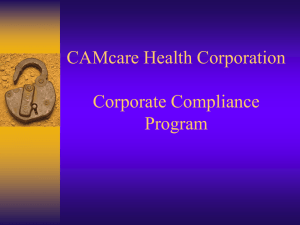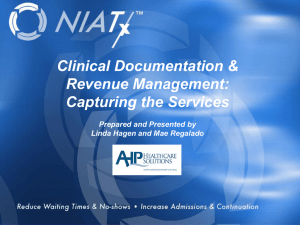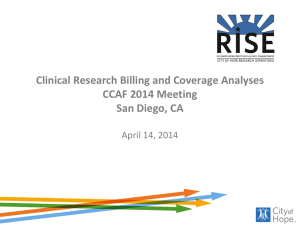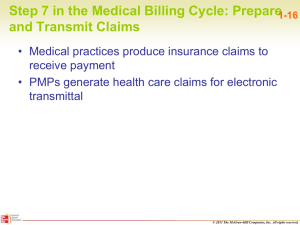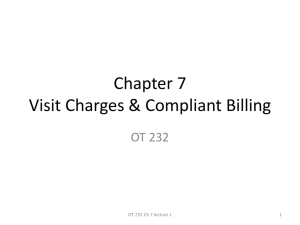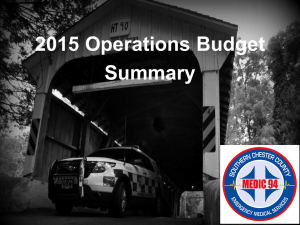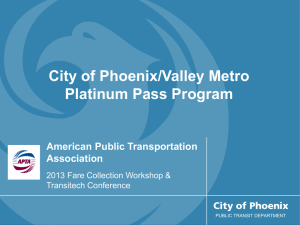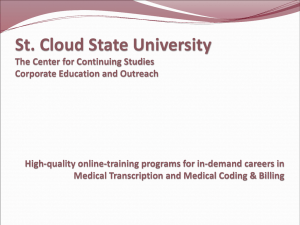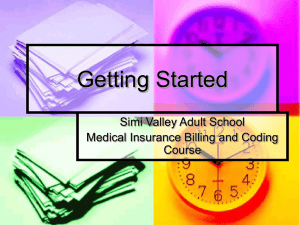Medical Insurance Billing
advertisement
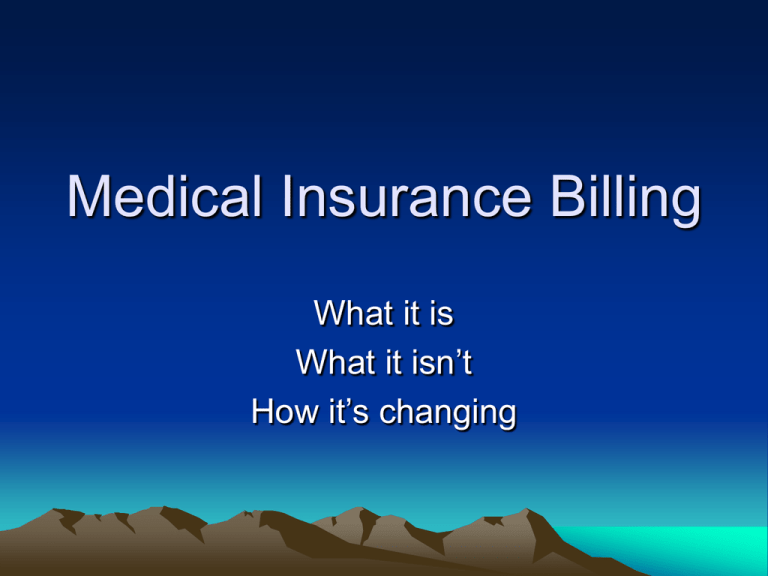
Medical Insurance Billing What it is What it isn’t How it’s changing Medical Billing is: • • • • • • Obtaining insurance information. Verifying insurance coverage. Making patient appointments. Gathering medical information. Maintaining the privacy of that information. Transferring Diagnostic and Treatment information into highly-specialized codes. Medical Billing Is: • Transferring insurance information, patient information and coded diagnosis and treatment information to a standard billing form or format. • Following up with insurers for tracking of payments. • Posting credits of payments made by insurance and patients. Medical Billling Is NOT: • • • • It’s not a get-rich quick scheme. It’s not just sending invoices. It’s not just billing the patient. It’s not just billing one way for all insurances – they are all different. • It’s not usually a way to work at home unless you already have a working relationship with a provider or billing service. Usually jobs that can be done at home can also be done off-shore! Medical Billling Is NOT: • It’s not a single class subject -- it’s a whole curriculum of subjects. • It’s never the same old thing! Welcome to challenge of Medical Billing! Be SURE you Signed the Attendance Sheet! Once you think you know what you are doing, the codes and the insurance rules change and you are back in the learning curve at least once a year! But so are all other medical billers! This year we are introducing ICD-10-CM coding to replace the entire ICD-9-CM code system for medical diagnoses. Changes to the health insurance industry related to the Affordable Care Act (ACA or “Obamacare”) are also implementing this year! Subjects Covered • Medical Information and the Law. Confidentiality, HIPAA, Malpractice, Fraud and Abuse. • The medical claim cycle – appointment to payment audit. • Insurance Terminology, Insurance Plans. • Medical and Financial Documentation: the Chart Notes, the Superbill and the Ledger. Subjects Covered • Coding of Diagnostic information (ICD-10CM coding). • Coding of Treatment Procedures and Supplies (CPT and HCPCS coding). • Completion of the CMS-1500 claim form data elements for the X12 837P electronic billing transaction. Subjects Covered • Private Insurance Plans. • Government Health Plans (Medicare, Medi-Cal, Tricare, ChampVA) • Funding structures: Fee-for-service versus Capitation. • Provider contracts. • Reading the Insurance Explanation of Benefits. Subjects Covered • Write-off/adjustment amounts and balance billing. • Coordination of Benefits between multiple insurances. • Patient Advocacy. • Collections. • Job Search strategies. Subjects Not Covered • Medical Terminology is a required skill that is offered in either a lecture class or a computer-based self-study module course. • Medical Assisting (Back-Office) is a complimentary, but different course. • Hospital Facility Billing is beyond the scope of a course in physician billing. (We will, however, look at the concepts behind facility charges and the UB-04.) • There is no “externship” program at this school. • Further studies in medical billing can be obtained either at the Conejo Adult School (which has an externship program) or at Santa Barbara City College (which has a hospital coding program). Books You Will Purchase: • Medical Insurance textbook (see the • Course Website) Books You Will Purchase: • ICD-10- CM Books You Will Purchase: • CPT Professional AMA Edition This Course IS: • A way for beginners to learn about and enter the field of Medical Insurance Billing. • A way for medical billers to gain additional skills and prepare for certification. • A way for medical professionals to understand the billing process. • A way for patients and families of patients to understand their insurance and their rights. About This Course: • This isn’t a self-study course, and students will need to attend lectures and turn off cell phones and refrain from chatter during lecture times. • This isn’t a guarantee you will find a job, but it should give you job skills. Be sure to prepare a resume and ask about possible externship credits. Participation • All students are encouraged to raise their hands when they have personal experiences to share or questions to ask. • If you cannot hear your instructor, please sit in the front row or raise your hand and ask the instructor to speak UP! • This is your course, make every minute count! Courtesy Rules • All cell phones must be off or turned to vibrate. • Students may not smoke on campus. • Questions are welcomed ONLY if a student raises his/her hand and is recognized before speaking. • Cross-talking while the instructor is lecturing or during a test is PROHIBITED. Student Conduct • Unexcused absences: Students will be dropped if they have more two consecutive absences without contacting the instructor and/or obtaining a physician’s note. • Students who cross-talk during class will be sent home on second warning. • If a student must be sent home a second time due to cross-talking they will be dropped due to unexcused absence. This Course is NOT a competition! Everybody is a winner as long as they are courteous, attend lectures and labs, do the projects and the homework and take the quizzes. Class Resources Website: www.mediclaimclass.net Your Instructor Your teacher is Thomas Fitzsimmons, CPC, RHIT, NCICS CPC= Certified Professional Coder. An credential in advanced physician coding offered by the American Academy of Professional Coders (AAPC.com). RHIT= Registered Health Information Technician. A credential in medical records technology, primarily for hospitals, offered by the American Health Information Management Association (AHIMA.org). NCICS= Nationally Certified Insurance and Coding Specialist. An entry-level certification of medical insurance and coding skills offered by the National Center for Competency Testing (NCCTinc.com). This course should prepare you for the NCICS examination should you decide to take it. Former Blue Cross claims examiner and appeals reviewer, provider relations and training specialist for Transamerica, CMS contracted Medicare Part B carrier, medical billing and coding faculty of American Career College, Kaplan College and Simi Valley Adult School and Career Institute. Your instructor has an associate’s degree in print journalism from Moorpark College, a bachelor’s degree in liberal studies from Excelsior College, and an associate’s degree in health information management from Santa Barbara City College. Student Introductions Please stand up and share: Your name? What you would like to get out of this course (besides just a job)? What you would be doing if you were not here taking this class? Participation/Attendance • Students who are not present for class lose participation points. A tardy subtracts five points. An absence subtracts 12 points, or a point for every 15 minutes missed. • When subtracted from an exam of 25 points this is 25-12=13 or a score of 52% which is a failing grade. Attendance is very important. If an attendance is excused with a doctor’s note, police report or death certificate, the points will not be subtracted. Required Materials • Textbook and ICD/CPT books (See instructions on class website). • Handout materials: – Course Calendar – Reading Supplements – Exercises (Coding) Evaluations/Projects Exams: • Computers and Customer Service • HIPAA Privacy Rules • Insurance Terminology • Medicare Program • Diagnosis Coding • Procedure Coding Make-up exams are ONLY provided in the case of an excused absence (doctor’s note, police report or death certificate). Two unexcused absences = drop. Extra credit is mandatory when the score on any exam is less than 70% (i.e., -5 or more). Student Presentation Projects Two presentation projects are required. Students will summarize their research briefly for their classmates. • Job search results: Five medical billingrelated job posts from the internet, showing job duties, qualifications, and hourly pay. • Violations of HIPAA law in the news. Five printed articles from the internet. Job Search Questions What kind of jobs are there for Medical Billing and related skills? What kinds of qualifications are needed to obtain employment? What is the pay offered for these positions? – These are best answered by searching the internet for positions being advertised in the local area currently. I recommend using • www.indeed.com Search for terms such as: • Medical Billing • Medical Collections • Patient Registration • Medical Coding • Claims Processing Accounts Receivable Insurance Billing Insurance Verification Patient Accounts Claims Examiner HOMEWORK Due next class meeting! • • • • • • Print-out five job posts (if you do not have a computer, please research and print at Simi Valley Library or a library near you. Printed projects may NOT be emailed.) Read Chapter 1, Introduction to Medical Billing Cycle. Do the Chapter 1 “review questions” and “applying your knowledge.” Read Chapter 3, Patient Encounters and Billing Information. Do the Chapter 3 “review questions” and “applying your knowledge.” Bring a #2 pencil for a practice Scantron quiz on Computers and Customer Service.
